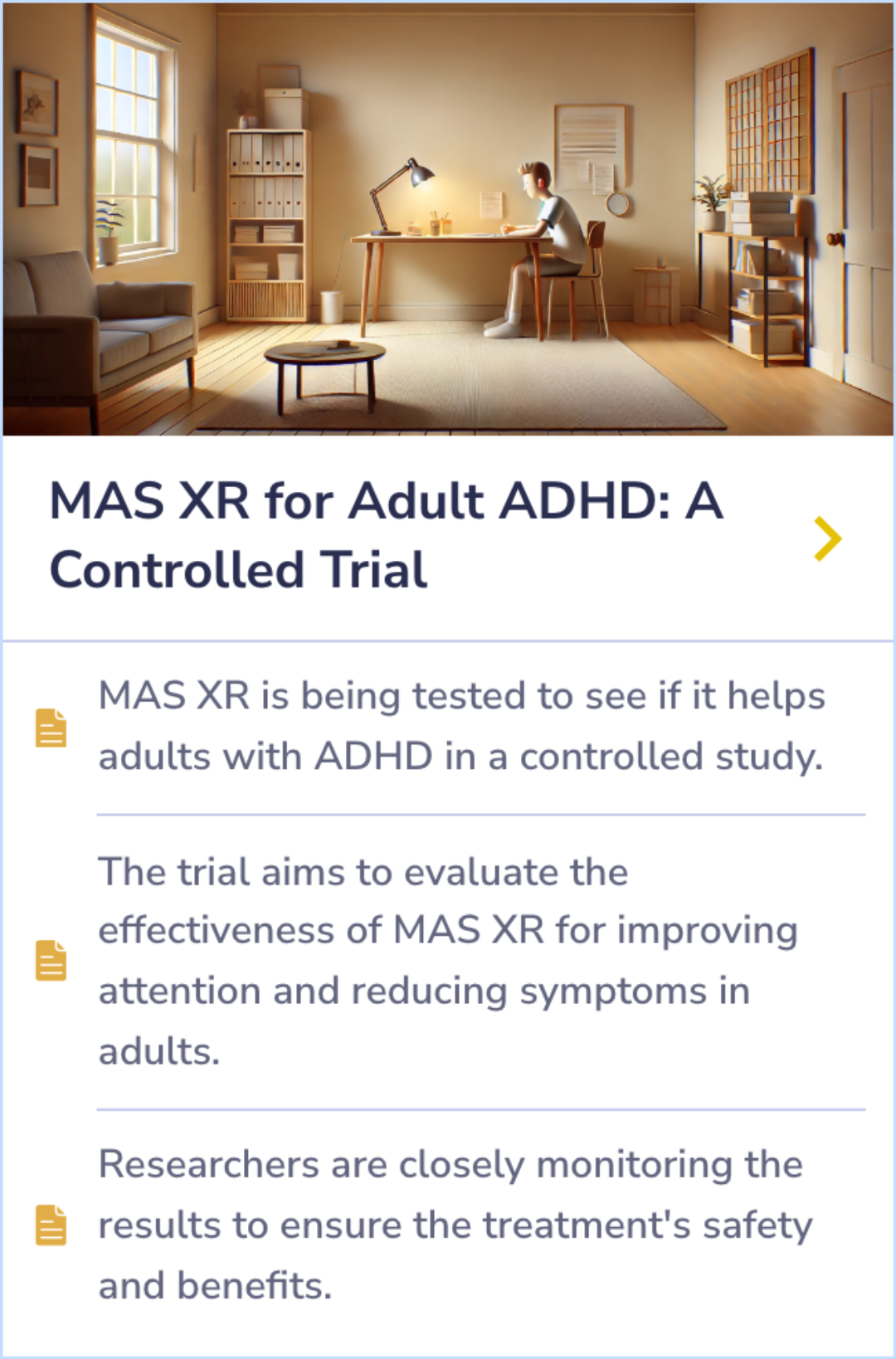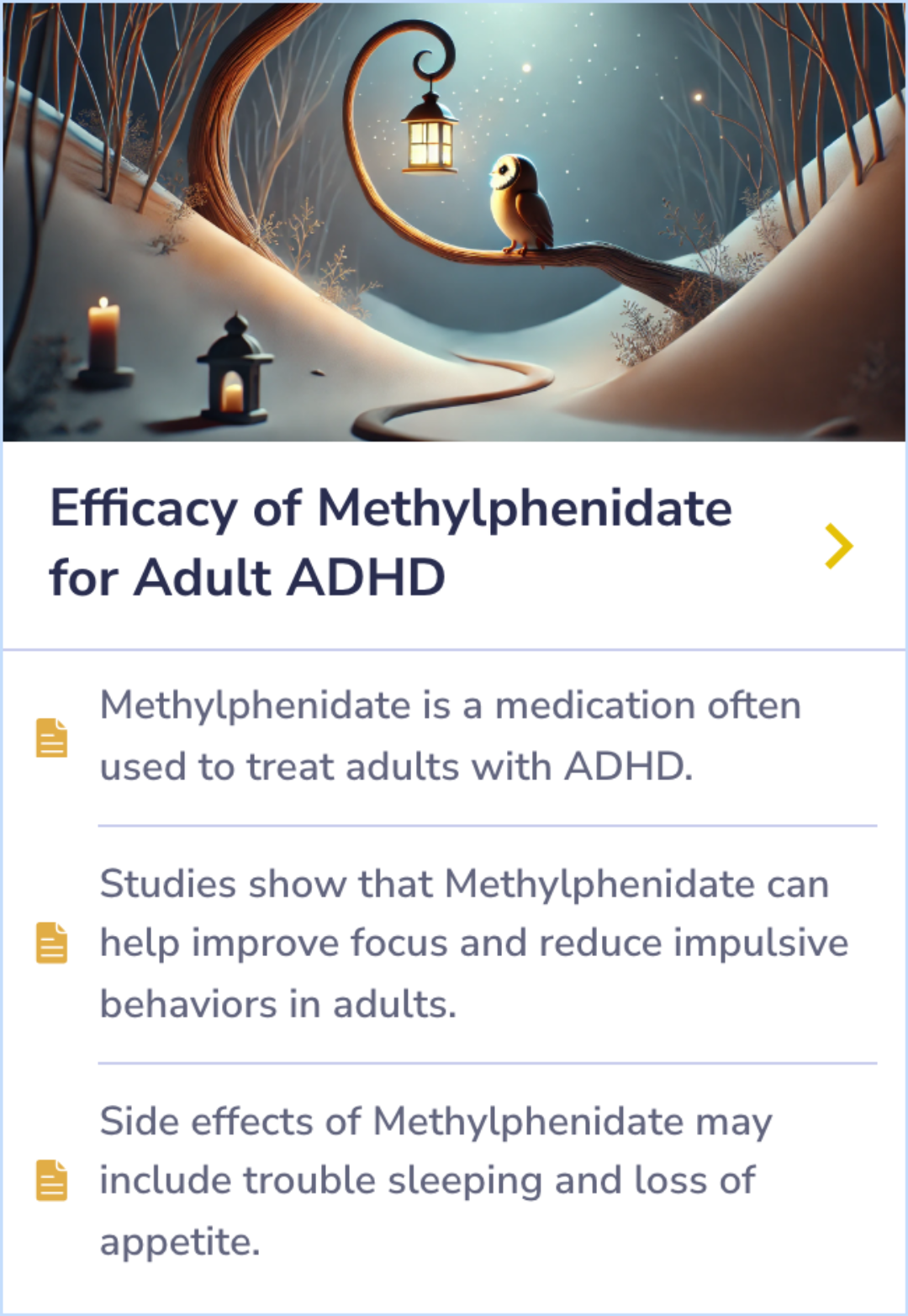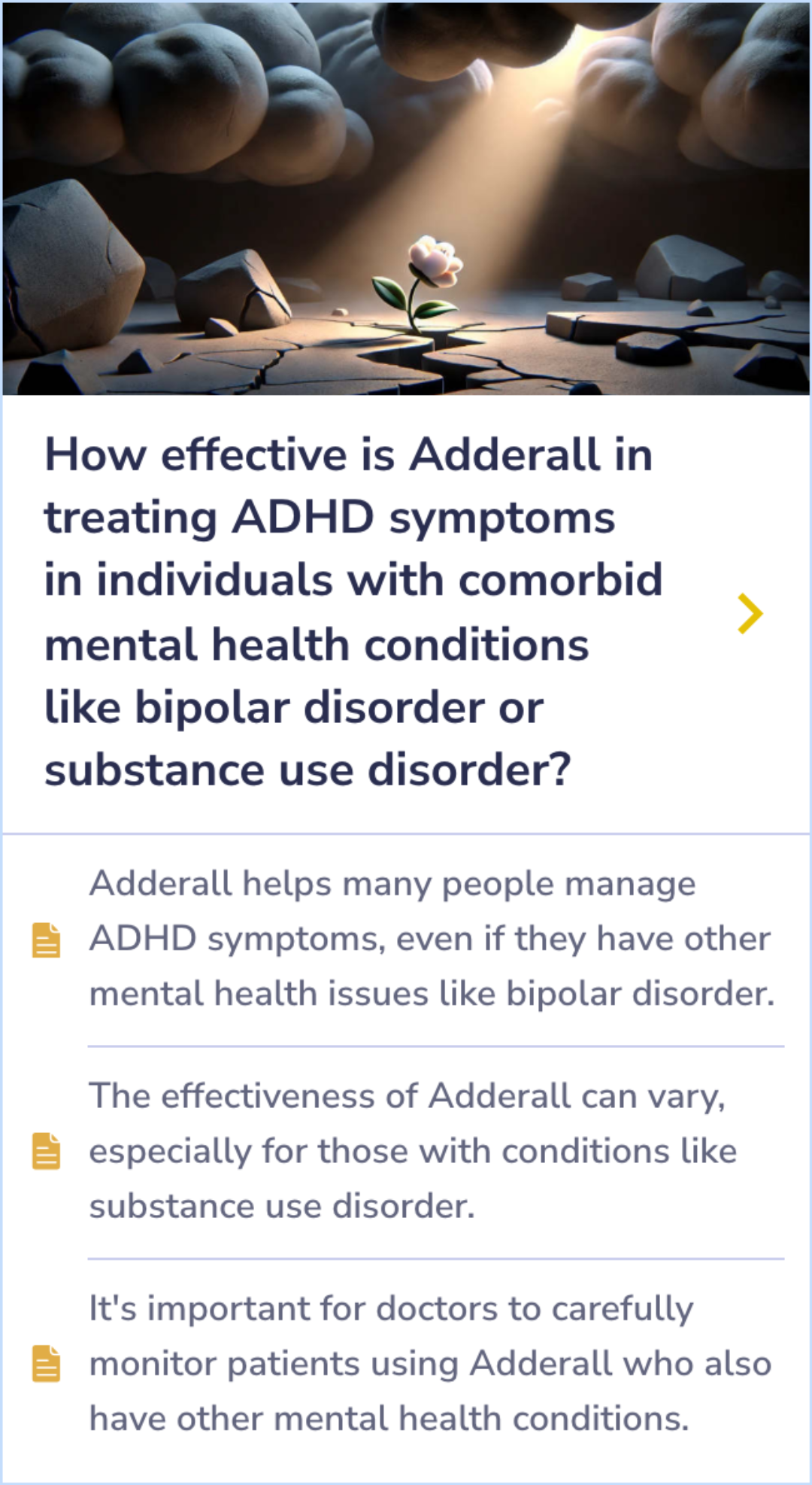Adderall
Evidence Based Answers
Is Adderall effective in treating adults with ADHD?
Adderall shows fast-acting relief for ADHD symptoms, more effective than nonstimulants. However, misuse risks are higher with immediate-release forms.
Published: October 24, 2024
Click to explore a section:
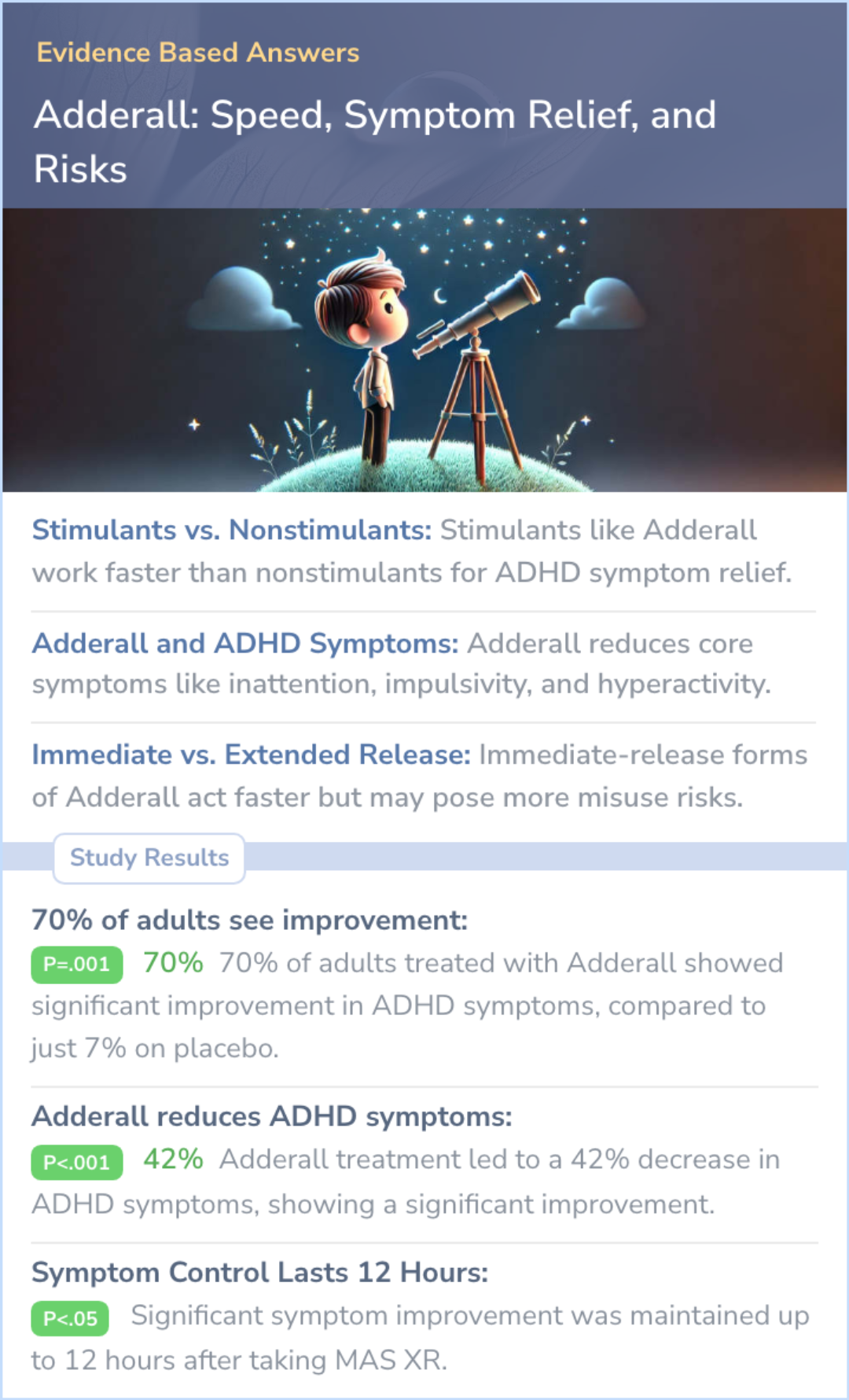
Adderall offers faster ADHD symptom relief than nonstimulants but comes with a higher misuse risk for immediate-release forms.
Studies Summary
💊
Adderall and Symptom Reduction
Adderall effectively reduces core ADHD symptoms like inattention and hyperactivity. Some studies find it more effective than alternatives but with a higher risk of side effects.
🕒
MAS XR and ADHD Symptom Control
A study on MAS XR, a form of Adderall, demonstrated significant symptom reduction in adults with ADHD across various doses, lasting up to 12 hours after taking the medication.
📅
Adderall's Long-Term Use Uncertain
While Adderall provides benefits over several weeks, its long-term effectiveness for adult ADHD is still under investigation, highlighting the need for regular reassessment by physicians.
Highly Cited Studies
Long term Effects of Methylphenidate in Adults
Peer Reviewed Study 1
MAS XR Reduces ADHD Symptoms in Adults
Peer Reviewed Study 2
Adderall's Effectiveness in Reducing ADHD Symptoms in Adults
Peer Reviewed Study 3
Adderall's Effectiveness in Treating ADHD in Adults with Co-occurring Disorders
Background: How Do Stimulant Medications Like Adderall Compare to Nonstimulants?
Stimulant medications like Adderall are often chosen for adults with ADHD due to their immediate impact on symptoms such as inattention and hyperactivity.
In contrast, nonstimulant medications may take weeks to achieve full therapeutic effectiveness.
Studies indicate that stimulants typically offer greater symptom relief than nonstimulant alternatives.
In contrast, nonstimulant medications may take weeks to achieve full therapeutic effectiveness.
Studies indicate that stimulants typically offer greater symptom relief than nonstimulant alternatives.
“
Source Quotes:
For most adults with ADHD, we suggest first-line pharmacologic treatment with a stimulant medication (eg, amphetamines or methylphenidate) rather than nonstimulant medications such as atomoxetine or antidepressants.
Meta-analyses have shown that effect sizes in short-term trials of adult ADHD are greater for stimulants compared with nonstimulant medications, including atomoxetine and atypical antidepressants.
Background: Adderall's Efficacy in Reducing Core ADHD Symptoms
Adderall is effective in reducing core ADHD symptoms, including inattention, impulsivity, and hyperactivity.
Some studies suggest amphetamines may provide slightly better symptom reduction than methylphenidate, though they also carry a higher risk of side effects.
Both the benefits and risks of these medications should be carefully weighed.
Some studies suggest amphetamines may provide slightly better symptom reduction than methylphenidate, though they also carry a higher risk of side effects.
Both the benefits and risks of these medications should be carefully weighed.
“
Source Quotes:
While amphetamines and methylphenidate have long been considered comparably efficacious for adult ADHD, some data appear to show a benefit of amphetamines in reducing core symptoms of ADHD compared with methylphenidate.
After 12 weeks of treatment, individuals treated with amphetamines showed greater effect on clinician rating scales of overall ADHD symptoms than methylphenidate.
Background: What Do We Know About Long-Term Use of Adderall?
The long-term effectiveness of Adderall for adult ADHD remains under study.
While benefits have been observed over several weeks, there is less data on its effects over longer periods.
Physicians should regularly reassess the usefulness of Adderall for each patient to ensure it remains effective and safe.
While benefits have been observed over several weeks, there is less data on its effects over longer periods.
Physicians should regularly reassess the usefulness of Adderall for each patient to ensure it remains effective and safe.
“
Source Quotes:
The effectiveness of Adderall® for long-term use has not been systematically evaluated in controlled trials. Therefore, the physician who elects to use Adderall® for extended periods should periodically reevaluate the long-term usefulness of the drug for the individual patient.
Results from trials and observational studies suggest that continued stimulant treatment may lead to sustained improvement in ADHD symptoms for at least 24 to 52 weeks.
Background: Adderall's Immediate and Long-Acting Effects
Adderall is available in both immediate-release and extended-release forms, each affecting symptom management differently.
Immediate-release forms offer rapid relief but may have a higher risk of misuse compared to extended-release versions.
Selecting the appropriate formulation is important for optimizing treatment and minimizing risks.
Immediate-release forms offer rapid relief but may have a higher risk of misuse compared to extended-release versions.
Selecting the appropriate formulation is important for optimizing treatment and minimizing risks.
“
Source Quotes:
The immediate-release tablet (Adderall) is usually taken 2 to 3 times daily, 4 to 6 hours apart, with or without food.
Studies suggest that longer-acting stimulants may be less likely to be abused or diverted.
Background: Understanding the Side Effects of Adderall
Adderall can cause side effects ranging from common issues like nervousness and headaches to serious cardiovascular risks such as sudden death, heart attack, or stroke.
These severe risks are particularly concerning for adults with preexisting heart conditions.
The risks and benefits of Adderall should be carefully considered in treatment decisions.
These severe risks are particularly concerning for adults with preexisting heart conditions.
The risks and benefits of Adderall should be carefully considered in treatment decisions.
“
Source Quotes:
Dextroamphetamine and amphetamine may cause sudden death, heart attack, or stroke in adults, especially adults with heart defects or serious heart problems.
Sudden deaths, stroke, and myocardial infarction have been reported in adults taking stimulant drugs at usual doses for ADHD.
Peer Reviewed Study
Study: MAS XR Reduces ADHD Symptoms in Adults
This study evaluated the effectiveness of mixed amphetamine salts extended-release (MAS XR) in adults with ADHD. Adults aged 18 and older received either a placebo or MAS XR at doses of 20, 40, or 60 mg/day for 4 weeks. The results showed significant reductions in ADHD symptoms across all dose groups, with improvements lasting up to 12 hours post-dose.
Most adverse events were mild or moderate, with no significant cardiovascular changes observed.
Most adverse events were mild or moderate, with no significant cardiovascular changes observed.
author
Weisler RH, Biederman J, Spencer TJ, Wilens TE, Faraone SV, Chrisman AK, Read SC, Tulloch SJ
journal
CNS Spectr.
Date Published
2006 Aug
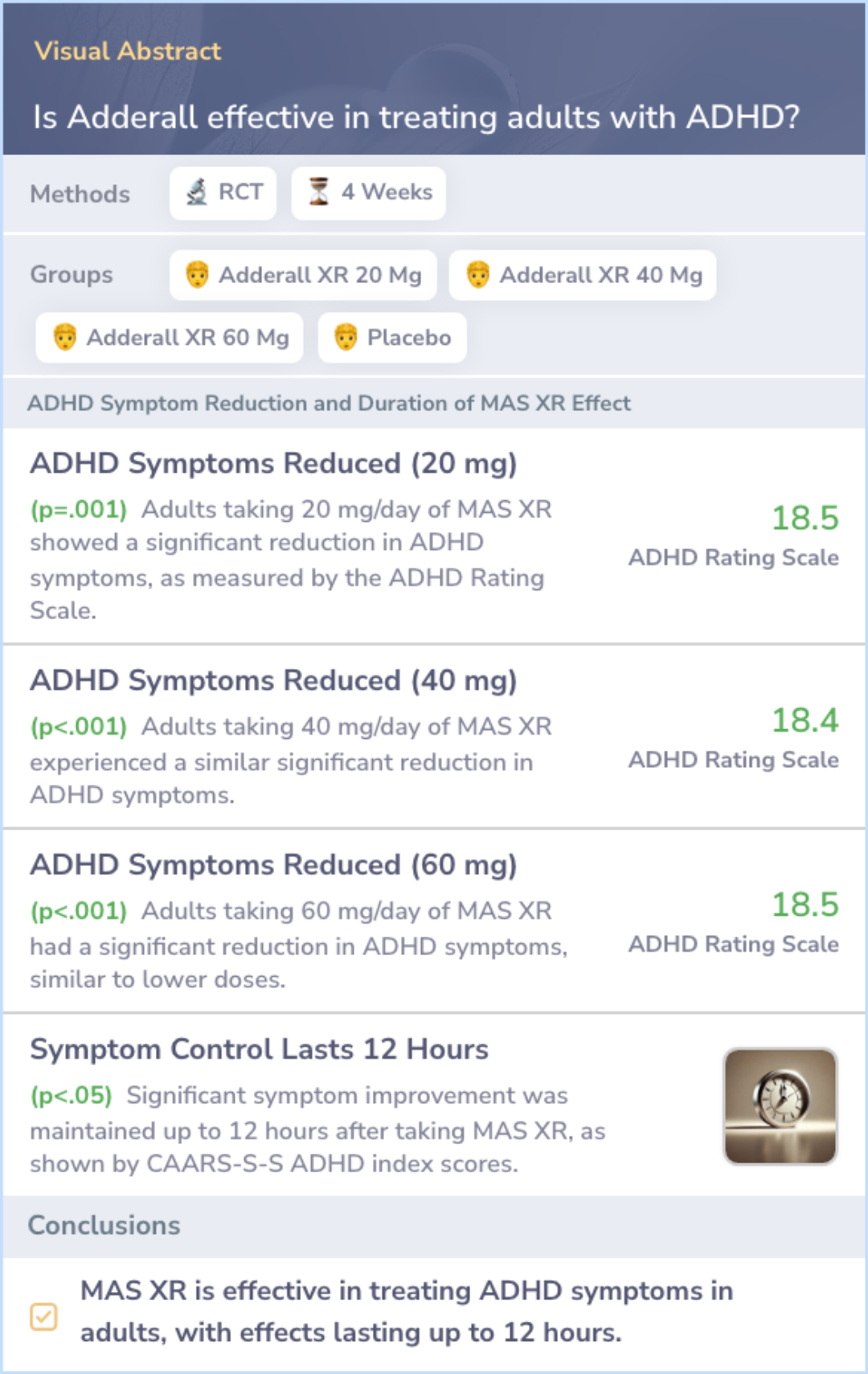
Peer Reviewed Study
Study: Adderall's Effectiveness in Reducing ADHD Symptoms in Adults
This study tested Adderall, a mix of amphetamine salts, on adults with ADHD. Over 7 weeks, 27 adults participated in a double-blind, placebo-controlled study. Adderall was titrated up to 30 mg twice daily, and participants' ADHD symptoms were measured using the ADHD Rating Scale and Clinical Global Impression Score.
Results showed that Adderall led to a significant reduction in ADHD symptoms, with a 42% decrease on the ADHD Rating Scale. Additionally, 70% of participants showed improvement, compared to only 7% with placebo.
Results showed that Adderall led to a significant reduction in ADHD symptoms, with a 42% decrease on the ADHD Rating Scale. Additionally, 70% of participants showed improvement, compared to only 7% with placebo.
author
Spencer T, Biederman J, Wilens T, Faraone S, Prince J, Gerard K, Doyle R, Parekh A, Kagan J, Bearman SK
journal
Arch Gen Psychiatry
Date Published
2001 Aug
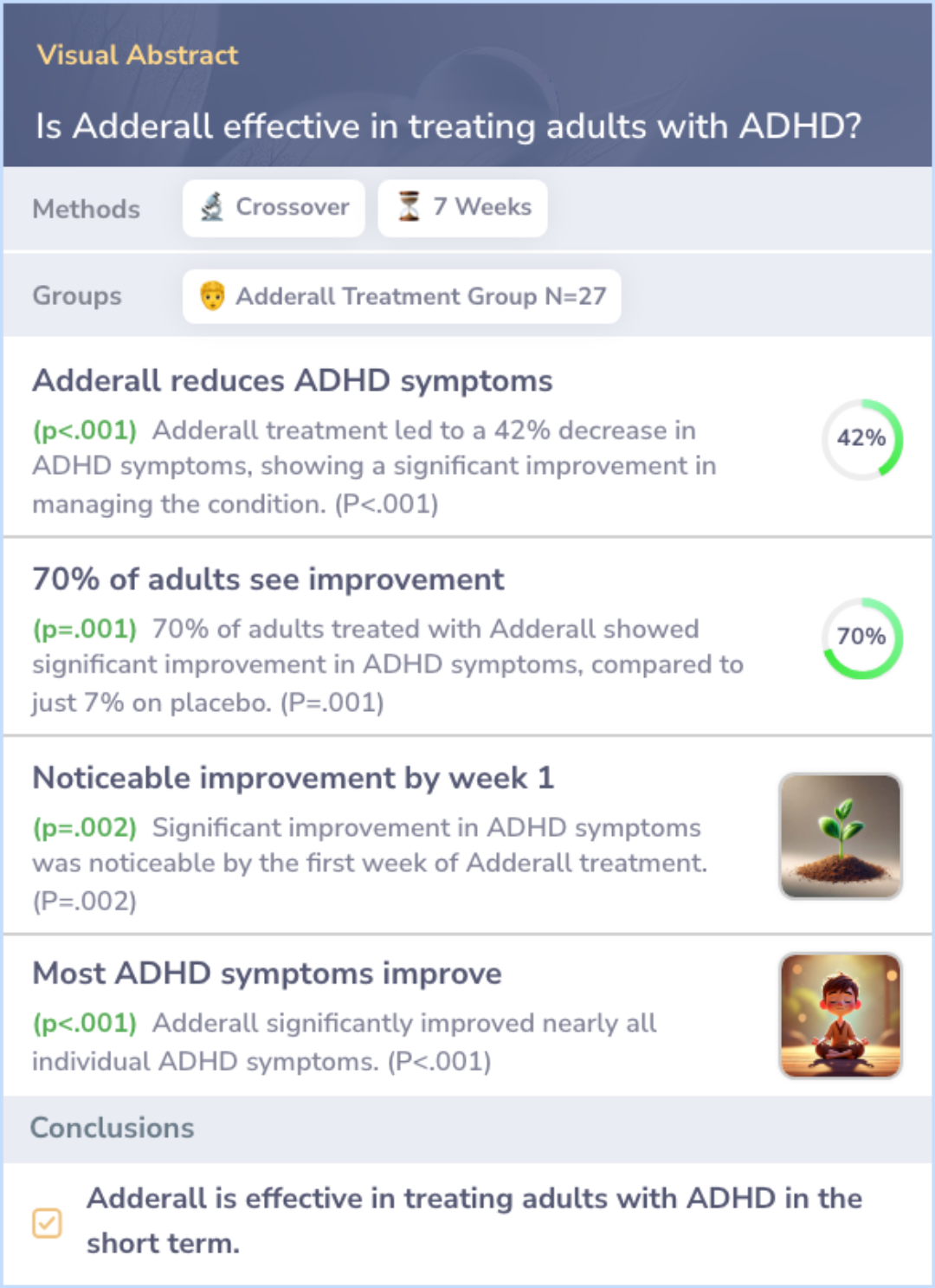
Peer Reviewed Study
Study: Adderall's Effectiveness in Treating ADHD in Adults with Co-occurring Disorders
The study evaluated the effectiveness of extended-release mixed amphetamine salts, a component of Adderall, in treating adults with both ADHD and cocaine use disorder. Results showed that a significant percentage of participants in the medication groups experienced at least a 30% reduction in ADHD symptom severity.
Additionally, participants in the medication groups had higher odds of having cocaine-negative weeks and achieving continuous abstinence in the last 3 weeks compared to the placebo group.
Additionally, participants in the medication groups had higher odds of having cocaine-negative weeks and achieving continuous abstinence in the last 3 weeks compared to the placebo group.
author
Levin FR, Mariani JJ, Specker S, Mooney M, Mahony A, Brooks DJ, Babb D, Bai Y, Eberly LE, Nunes EV, Grabowski J
journal
JAMA Psychiatry
Date Published
2015 Jun
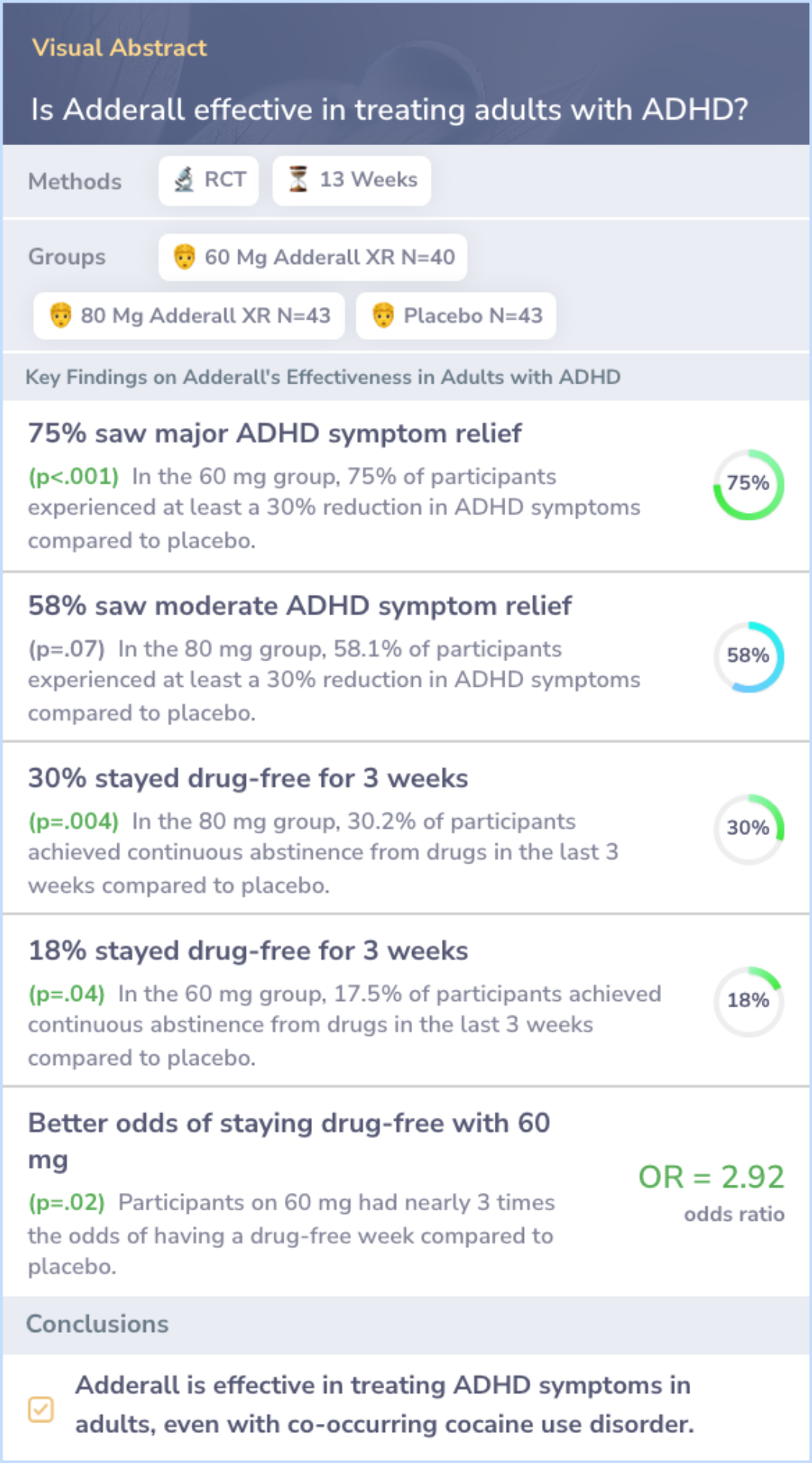
Key Takeaways
Conclusions
Research indicates that Adderall effectively reduces ADHD symptoms in adults, often providing quicker relief compared to nonstimulants, and is primarily considered due to its immediate impact on core symptoms like inattention and hyperactivity. Various studies highlight the benefits of both immediate-release and extended-release forms in symptom management, emphasizing significant improvements for many individuals.
Despite its efficacy, the potential for side effects and the need to continually assess its long-term benefits are noted, requiring careful consideration when choosing this treatment. Additionally, Adderall's effectiveness extends to adults with co-occurring disorders, showcasing its versatility as a therapeutic option.
Despite its efficacy, the potential for side effects and the need to continually assess its long-term benefits are noted, requiring careful consideration when choosing this treatment. Additionally, Adderall's effectiveness extends to adults with co-occurring disorders, showcasing its versatility as a therapeutic option.

Evidence Summary
Evaluating Stimulant Versus Nonstimulant Treatments for ADHD
The content dives into the specific attributes of medications like Adderall in managing ADHD symptoms. Stimulants offer swift relief for inattention and hyperactivity, often outperforming nonstimulants, which require more time to show effects.
Studies reveal that while amphetamines may excel in symptom management, they also present a higher risk of adverse effects, requiring careful consideration of both benefits and risks.
Studies reveal that while amphetamines may excel in symptom management, they also present a higher risk of adverse effects, requiring careful consideration of both benefits and risks.
Evidence Summary
Exploring Methylphenidate: Benefits and Side Effects
Methylphenidate, commonly used for adults with ADHD, effectively boosts focus and curbs impulsive actions. However, it comes with the price of potential side effects like difficulty sleeping and appetite loss.
While Adderall grabbed attention in the studies for its acute impact on symptoms, methylphenidate offers a viable alternative and shows promise in symptom management for adults.
While Adderall grabbed attention in the studies for its acute impact on symptoms, methylphenidate offers a viable alternative and shows promise in symptom management for adults.
Evidence Summary
Navigating Adderall Use with Co-Existing Conditions
Adderall can help manage ADHD symptoms, even in individuals with additional mental health issues like bipolar disorder. However, those dealing with conditions such as substance use disorder might experience varied outcomes. Close medical supervision is vital to ensure Adderall's benefits for people facing multiple mental health challenges.
This personalized approach aligns with the broader understanding of stimulant medications like Adderall often being chosen for their immediate effects.
This personalized approach aligns with the broader understanding of stimulant medications like Adderall often being chosen for their immediate effects.
